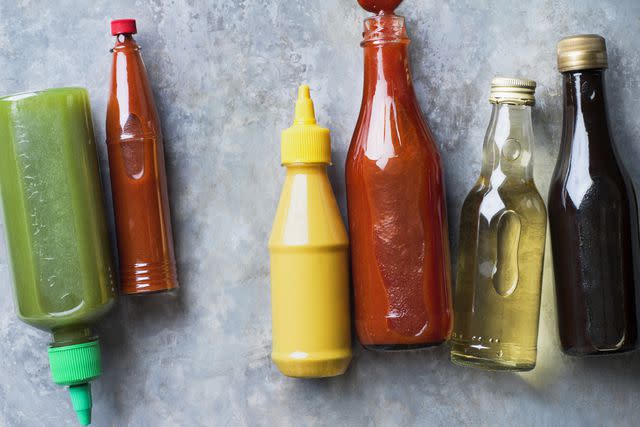How Long Every Type of Condiment Lasts After You Open It
Food safety experts detail the fridge (and pantry) shelf life of everything from ketchup and salad dressing to mayonnaise.

Getty Images
Do you have a stash of sauces, dips, and dressings in the depths of your refrigerator? If so, you're not alone. It's common to keep condiments for many months, since they're typically consumed at a slower rate than fresh foods. Condiments are also known to have long shelf lives due to their highly acidic nature—a feature that's undesirable for harmful germs.
This doesn't necessarily mean condiments will stay fresh forever. To learn more, we asked food experts to share how long condiments last before and after they're opened—plus, they shared their best tips for identifying a spoiled condiment.
Related:The Best Place to Store All of Your Favorite Condiments, According to Food Safety Experts
How Long Unopened Condiments Last
Unopened, many condiments will last about one year in the pantry. You can determine a more specific timeline by checking the "use by" or "best by" date on the packaging. Even then, the listed date will indicate when the quality of the item will decline, rather than its safety, says Kimberly Baker, Ph.D., RD, LD, the director of the Clemson Extension Food Systems and Safety Program Team. This means you can safely eat the condiment after the best-by date, but its color, taste, and texture may be lacking.

Getty Images
How Long Condiments Last After You Open Them
After a condiment is opened, it should be stored in a refrigerator. The approximate shelf life will depend on the specific type of condiment and, more importantly, the temperature of your fridge. According to Baker, the fridge should be set to 40 degrees Fahrenheit or lower to ensure optimal freshness, regardless of the condiment type.
Ketchup
From breakfast sandwiches to crispy French fries, countless foods are better with ketchup. As for how long ketchup lasts? Once opened, the versatile condiment is safe to eat for about six months, according to the U.S. Department of Agriculture. This long shelf life is due to ketchup's high acidity, which makes it difficult for illness-causing germs pathogens to grow, says Baker.
Mustard
According to the USDA, an opened jar of mustard will last for one year in the fridge thanks to the condiment's low concentration of sugar, which is an excellent source of nutrition for spoilage microorganisms, says Bryan Quoc Le, Ph.D., a food consultant and the author of 150 Food Science Questions Answered. Additionally, the mustard seed used to make mustard contains allyl isothiocyanate, a compound responsible for the condiment's sharp and spicy flavor. According to Le, allyl isothiocyanate has natural anti-microbial properties, which help protect the mustard from spoilage.
Mayonnaise
If you regularly make dishes like sandwiches and pasta salad, there's a good chance you have a jar of mayonnaise in the fridge. That opened container of mayonnaise will last for about two months, so long as it's stored properly, says Baker.
Salad Dressing
"Opened store-bought salad dressing will last in the refrigerator for approximately one to three months," says Baker. The exact timeline depends on the type of dressing, and therefore, its acidity. In general, less acidic versions (like cream-based dressings) have a shorter shelf life, while more acidic dressings (like vinaigrettes) have longer ones, says Baker.
As for homemade concoctions? According to Baker, vinaigrettes and cream dressings made from scratch will last three and two weeks, respectively.
Hot Sauce
If you're a fan of hot sauce, you'll be glad to know that the condiment can last for about one year in the fridge after it's opened, says Baker. The reason? The condiment's vinegar content; you'll find this primary ingredient in most hot sauces. Fermented hot sauces can last even longer—indefinitely, in fact—as the microorganisms that ferment the sauce produce natural preservatives, says Le.
The exception is homemade hot sauce, which lacks the fermentation methods used in commercial products. Hot sauces made from scratch will last about three months in the fridge, according to Le.
Related:11 Unexpected Foods That Taste Delicious With Hot Sauce, From Ice Cream to Apples
Relish
"Relish can usually last up to nine months in the refrigerator," says Le. "Sweeter relishes may last for less time due to the higher concentration of sugar, which feeds many microorganisms." Products with citric acid, vinegar, or preservatives like sodium benzoate or potassium sorbate will likely have a longer life cycle, so it's worth checking the ingredient list for an idea of how long your relish will last, adds Le.
How to Tell If Opened Condiments Have Gone Bad
Although store-bought sauces and dips last longer than other foods, it's still important to know the signs of spoiled condiments. Take note of sour or fishy odors, which indicate the item has gone bad, says Le. Additionally, if there is slime or mold growing on the surface (or anywhere in the container), it's time to throw it away, he adds.
Note that it's possible to contaminate a condiment, potentially reducing its shelf-life. To avoid contamination, make sure the lid of the condiment's container is always tight and secure, says Baker. It's also a good idea to avoid using condiments near raw meats—or using dirty utensils to remove the product from its original container. "If the product does become contaminated, it should be thrown out as safety cannot be guaranteed," says Baker.

